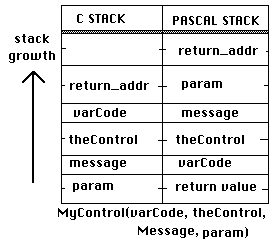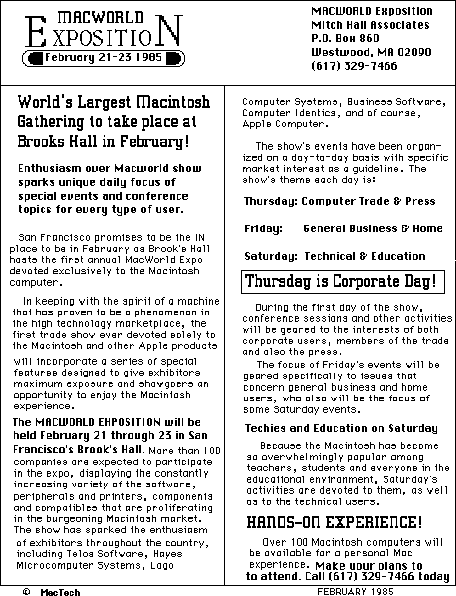

|
| Volume Number: | 1 | |||
| Issue Number: | 3 | |||
| Column Tag: | LETTERS, MOUSEHOLE | |||
Letters, Mousehole 
NO VAPOROUS FLUFF
Enclosed is my subscription to MacTech. I really appreciate the quality of the articles and the technical detail they contain. MacTech is a refreshing change from the vaporous mass market Macintosh magazines. I would like to see in a future issue, an article or series of articles describing how to interface with the packages, in particular the disk package.
Robert Leyland
Novato, CA.
A C BENCHMARK PROGRAM
While I do have your attention, I would like to pose the following test for the Mac C compiler from Consulair Corporation:
main()
{
union u_storage{
long a_long;
struct T_0000{
short a_short;
short B_short;
}S_0000;
)storage;
storage.a_long = 6;
printf(“/na_short = %d”, storage.S_0000.a_short);
printf(“/nb_short = %d”, storage.S_0000.b_short);
printf(“/n”);
}
Three implementations I worked with generated these results:
COMPILER X: a_short = 60 b_short = 0 COMPILER Y: a_short = 0 b_short = 60 COMPILER Z: a_short = 0 b_short = 6
If Consulair’s C generates code similar to Compiler Z, I am definitely interested in it!
Robert Heinich
Boca Raton, Fl.
There wasn’t time to report the results this month, but watch for it next month in Bob’s C column. D.S.
A CONTROL DEFINITION FUNCTION
Thought I’d share with your readers part of a program I’m working on. I need to have a control similar to the small double-pointed arrow used to set the time in the alarm clock, except acting more like the arrows in scroll bars, which activate only when you release the mouse button. According to the Control Manager section of Inside Macintosh, this requires writing a control definition function. The problem is, the other Toolbox routines treat this routine as if it were written in Pascal, and I want to use Aztec C. (Note: there is no problem calling a Pascal format toolbox routine from C). This required writing an assembly-language interface. [Manx informs me that they will soon be upgrading their C to allow imitatiing Pascal; this may still be useful for users of other C compilers]
My routine is called arrow_ctrl; this is actually the name of the assembly lang- uage interface which Toolbox routines like FindControl() call. It saves the caller’s address, then calls the high-level language routine a_ctrl. Since Pascal pushes arguements on the stack in the reverse order from C, I could have switched them in arrow_ctrl. Instead, I decided it was more efficient merely to reverse the order in a_ctrl (thus it varies from the archetypical MyControl() in IM). Aztec C returns the function value in register D0; Pascal expects it to be on the top of the stack. This is because Pascal functions pop their arguments off the stack; C requires the calling function to do this (thus allowing for variable numbers of arguments). [See figure 1 for an illustration of the stack used by C and Pascal; note distinction between words and longwords.]

What took me a bit longer to figure out was that C is using some registers that Pascal considers sacred. According to Manx, these were registers A2 and D3. An earlier version of my interface saved all registers except D0 and SP; you might want to do this for safety if you’re using a different compiler.
C PROGRAM SHELL
/* args are reversed because of Pascal
call */
long a_ctrl(param,message,ctrl,
variation)
int variation,message;
ControlHandle ctrl;
long param;
{
Rect *r;
r = &((**ctrl).contrlRect); /*pointer
to control’s rectangle */
switch (message) {
case initCntl:
.
. etc.
.
}
return(OL);
}
ASSEMBLY PROGRAM
long save_r, save_a2, save_d3; /* Used
in ASM interface */
#asm
public arrow_ct_;note truncation
arrow_ct_:
move.l (SP)+, save_r_;pop return addr.
move.l A2, save_a2_;save registers that C doesn’t,
but Pascal does
move.l D3, save_d3_
jsr a_ctrl_ ;call C routine
add.w #12,SP;wipe out params
move.l D0,(SP) ;put return value in Pascal position
move.l save_a2_,A2 ;restore register
move.l save_d3_,D3 ;restore register
move.l save_r_, -(SP);push return addr
rts;return to caller
#endasm
David Dunham
Goleta, CA.
MacPascal Looks Great!
The idea of a magzine devoted to programming and programmers is great. I am really looking forward to getting the first issue. I hope you have some good articles on MacPascal. I got mine the other day and it really looks nice. I just wish Apple would have put in a tutorial since I don’t know Pascal that well (yet). Oh well, learning the hard way is part of the fun. The store where I work is starting a Macintosh Users Group. We plan a newsletter and hopefully a BBS. When we get the newsletter printed up, I’ll send you a copy of it.
Jeff Goza
Abilene, TX.
Inside Mac Trouble
I am writingin regards to your ad in the new MacWorld. Journal looks really fantastic for me. I have trouble with Inside Mac, but seem to have more assembly /Pascal experience than most. However, I am a student, and [it follows...] poor. So, if you would, please send me a sample issue of MacTech at your convenience to try it out. (Enclosed is $2 for said issue).
Barry Polley
Ithaca, NY
Sample issue from last month is on the way. D.S.
C Questions...
I recieved my first issue of MacTech. Terrific! If the content continues to improve from this level of good programming aids for the Mac, it will be a superior Tech Journal. A few quick questions: Several references are made to Consulair C; I would appreciate more info on availability and cost. How does the Aztec C for the Mac stack up against the Consulair C or the Hippo C or others? This might make a good short article for MacTech. I use the Aztec C for the Apple II but it came bare-bones with no support library for Apple Graphics, sound or anything. Is the Aztec Mac C any beter?
David B. William
Professor of Music
Illinois State U.
We currently are avoiding the software review tar pits. But Bob may wish to respond in the next issue.
Doctor’s Orders
I recently noticed your ad in the MacWorld (Jan. 85) issue. It looks as though this may be what the doctor (Ph.D.) ordered! And would you please be sure to include the Nov. 84 [Dec] issue.
Dr. Bill Roberts
Golden, CO.
The Dec. issue is only available for $3, as there are just a few left. D.S.
MOUSEHOLE REPORT
RUSTY HODGE
SYS OP
A MAC BBS
Benchmarks
Here are some “Sieve” benchmark measurements in case no one else has provided them:
MacPascal ..... 1,270 seconds
Basic 2.0 ...... 1,156 seconds
Basic 2.0 (compressed).... 1,040 seconds
I tried programming MacBasic V.82 but had series problems with system errors. (It’s not ready for anything serious yet). Interesting part was that it said “DIM Flags(8190) exceeded dimension limits”. Congrats on issue two, it’s stuffed with lots of goodies and will take a month to explore each of the different articles. I’m kinda disappointed that MacPascal was slower than basic. The “compressor” aspect of Basic 2.0 looks like a good efficiency improver with 15-20 percent for this small program.
JCOM
MacTech
Just got my first MacTech and it looks great!!! Finally something to explain that #$@*@ IM manual! If you are considering sending in your $$ to get MacTech, do it now. Don’t wait, you won’t be sorry. What do I need to do to get Vol. 1, No. 1? I’ll send my right arm to get that assembly shell. Sounds great.
THE ATOM
MS WORD
I just got the Dec. 15 version of MS Word and I must say that it is just what I need in the way of a real word processor. You can have four documents open at once and you can divide them into two sections just like Multiplan. I had heard that the older versions of Word worked really slow, but this seems to work fine and has drivers for lots of letter quality printers. It is not all that easy to change fonts and stuff, but how many times do you really use more than 2 or 3 fonts in a file? Also you have a horizontal scroll bar taht goes out to somewhere around 18" so that problem is history. Also support of footnotes and other goodies make this the real Word processor that anyone who needs series word processing needs. This version still doesn’t have multiple rulers, but I will call them up and see if they are going to implement them. And as most MS products, Word has a nice help file and other goodies.
THE WATCHMAN
WAIT FOR CALL...FOREVER!
When using MacTerminal and Apple modems, do NOT select “Wait for Call”. Just do nothing after starting and it WILL answer calls. With Hayes modems, DO select “Wait for Call”. Apparently the Apple modem isn’t as Hayes compatable as we thought.
ROBERT WIGGINS
SOFTWARE SUPPLEMENT WORTH IT!
If anyone is considering buying INSIDE MACINTOSH from Apple, spend the extra $100 and get the software supplement too. Not only are you the first on your block to get the new Mac utilities (like resource editor), but you also get all the Lisa software. Useless if you don’t have a lisa you ask? The software is no good to you, but I’ve already gotten my money back by using those disks instead of buying another couple of boxes of blank ones!
BURRILL SMITH




- SPREAD THE WORD:

- Slashdot

- Digg

- Del.icio.us


- Newsvine


